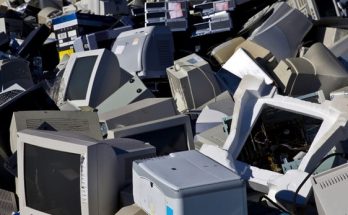The Electrical and electronic equipment (EEE) producers must embrace a paradigm shift in operation for Nigeria to protect the health of its citizens and economy.
Ibukun Faluyi, Executive Secretary, E-waste Producer Responsibility Organisation of Nigeria (EPRON), made the assertion on Tuesday, in Lagos.
Faluyi said EEE producers’ response to e-waste challenge and fulfillment of their statutory responsibility would assist the country to transit successfully to a circular economy in the electronic waste sector.
She said regulatory enforcement by appropriate authorities to drive compliance among producers should be intensified.
“Consumers on their parts should take an active interest in the electronic waste, and ask questions about the fate of each of the EEE they have purchased at its end of life”.
Faluyi noted that electronic waste (e-waste) was considered one of the growing global problems due to its high rate of generation and its hazardous composition.
“E-waste contains harmful substances with potential to cause adverse human health and environmental impact, if it is improperly managed. According to the 2020 Global e-waste monitor launched in July, 53.6 million metric tons (Mt) of e-waste was generated globally in 2019. The volume of space that this waste stream occupies pales into insignificance when compared with the fact that only 17.4 per cent of the 53.6Mt generated was officially documented as properly collected and recycled”.
According to her, when e-waste is not channelled through appropriate collection and recycling platforms, it is disposed off with municipal solid waste and a large percentage of it ends up in landfills or dumpsites.
She added that they eventually end in the hands of informal recyclers who employ crude recycling practices to harvest the valuable components, thus releasing toxic and hazardous substances into the environment.
Faluyi listed the hazardous substances released from e-waste as: mercury, lead, brominated flame retardants (BFR), chlorofluorocarbons (CFCs) and hydrochlorofluorocarbons (HCFCs).
“These substances have harmful effect on human health; mercury for example, has the potential to enter the food chain and accumulate in living organisms, damaging the central nervous system, thyroid, kidneys, lungs, immune system. CFCs and HCFCs can bring about skin cancers, eye-related diseases, and a weakening of the immune system, while lead can cause anaemia, weakness, kidney and brain damage”.
Faluyi stressed that environmentally sound management of electronic waste was a critical issue and intricately linked to the achievement of many Sustainable Development Goals (SDGs).
“It is primarily linked to the SDG 12 on sustainable consumption and production, as well as SDG 8 on decent work and economic growth. However, the achievement of SDG 3 on good health and wellbeing; SDG 6 on clean water and sanitation, and SDG 14 on life below water, can only be realised, if there is a transition from crude recycling practices to environmentally sound management of electronic waste”.
Faluyi noted that arrangements to fully realise the potential of the opportunities within the e-waste value chain and avoid health and environmental crisis associated with improper e-waste management activities was in place in Nigeria.
According to her, the National Environmental (Electrical/Electronic Sector) Regulations, which adopted the Extended Producer Responsibility (EPR) principle and delineates appropriately the responsibility for the management of e-waste on the producers is in place.
She said the regulation mandates all producers of various brands of EEE products to subscribe to the EPR Programme, including the Buy Back for their sector within two years.
“It requires that all who manufacture, assemble, or import EEE must take responsibility for their products when they are no longer functional. Tracking products from the moment they are purchased to when they are non-functional can be a challenge for a producer, because that is not their core responsibility”.
Faluyi added that an industry led approach was adopted to ensure that Nigerian producers could effectively fulfil this obligation.
“This approach requires that producers collectively pool resources based on their market share and coordinate the collection and recycling of their products in a cost-effective but environmentally sound manner”.
Faluyi noted that EPRON was formed in 2018, in response to regulation and guidelines to achieve collective compliance to the regulation and transparently use dedicated funds for environmentally sound management of end of life EEE.
She said data had shown that the rate of generation of e-waste would continue to increase, especially as technology had indeed come to the rescue of most sectors during the COVID-19 pandemic,
“It provides the platform for schools, organisations, religious organisations to carry on with their endeavours remotely, which means increased purchase of hardware and upgrade of existing ones to fit the technological needs and personal desires of users”.
Faluyi said the pandemic had made it imperative to focus more attention on e-waste, treat as an urgent and essential public service in order to minimise possible secondary impacts upon health and the environment.
EPRON Calls for More Attention to Tackle E-Waste Challenge
- Advertisement -
- Advertisement -
- Advertisement -
- Advertisement -
- Advertisement -

